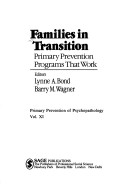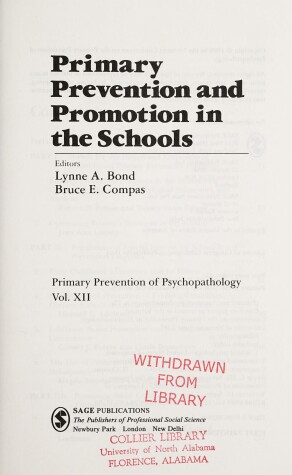Primary Prevention of Psychopathology
1 primary work • 3 total works
Book 14
Improving Children′s Lives
by George W. Albee, Lynne A. Bond, and Toni V C Monsey
The prevention/promotion efforts presented, consider the well being of individuals, the family unit as a whole and broader societal structures in which families are embedded. The focus is on both normative and non normative family transitions through the life span of the family.
Primary Prevention and Promotion in the Schools
by Lynne A. Bond and Bruce E. Compas
Primary Prevention and Promotion in the Schools is drawn from the 1987 Vermont Conference on the Primary Prevention of Psychopathology.


